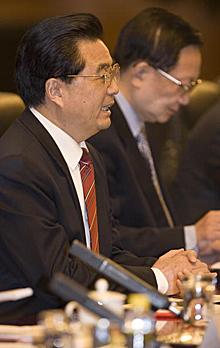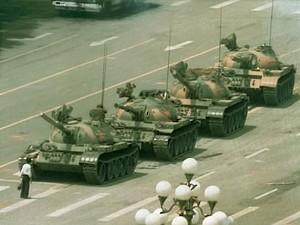Chinese President Hu Jingtao admitted recently that the Chinese Communist Party (CCP) regime is facing three unprecedented crises: A political crisis, a crisis revolving around social infrastructure, and a crisis concerning overall governance within the regime. Among them, the crisis of governance is the most threatening.
CCP is Faced With Three Unprecedented Crises
It was at the Annual Conference of the 12th Central Committee Political Bureau of 2006 that Hu admitted to the enormous pressure that the ruling party is facing. This pressure comes in the form of three unprecedented crises. These are: a political crisis, a social infrastructure crisis, and a crisis concerning governance. All three of these crises are triggered by and amplified by one another, creating a very difficult situation. Among the three crises, the one revolving around governance of the regime is most serious.Hu wasted no time in pointing out that the most serious and urgent issue the CCP is facing is the implementation of the party’s principles and policies to the entire country. This is critical in that it is needed to check, reverse, and ultimately solve the crisis. It is directly related to the country’s fate, the interests of 1.3 billion people, and the vitality of the party as a ruling party.
Vice Premier Wu Banguo said at the meeting that the escalation of the governance crisis at the local level had all but destroyed the stability of society, economic development, financial order, and any potential for a harmonious relationship between the people and the government.
Disclosures: 200 to 250 reports regarding political issues, social stability, or accidents submitted by local governments account for half of the various reports every day. A new trend has appeared recently, which is, more reports are about superstructure, democratic parties, and appealing events in religious circles. For example, legal proceedings against various party committees and government departments are used to put the heads of the respective government departments and legal departments into a passive state.
Premier Wen Jiabao said, “Lawsuits against the party or its government organs from all circles reflect not only the progress in the legal system and its law-making procedures, but also the administrative gap between the party, government organizations, and the law, which serves to worsen the crisis in governance.”
Summary of the 31-Province Questionnaire on CCP and its Organizations
The assessment questionnaire of CCP and its organizations of the 31 provinces, autonomous regions and the municipalities directly under the central government are summarized below:
(1) None of them are listed as Category 1 (good, very good, very satisfied), or Category 2 (good, satisfactory).
(2) Category 3 (normal) consists of: Beijing City, Tianjin City, Jiangsu Province, Zhejiang Province and the Tibet Autonomous Region. Ningxia Muslim Autonomous Region, Xinjiang Uygur Autonomous Region and Hainan Province.
(3) Category 4 (unsatisfactory, bad) consists of: Liaoning Province, Jilin Province, Guangdong Province, Fujian Province, Guangxi Zhuang Autonomous Region, Shanghai City, Shandong Province, Sichuan Province, Guizhou Province, Gansu Province and other provinces.
(4) Category 5 (very dissatisfied, poor) consists of: Hebei Province, Shanxi Province, Inner Mongolia Autonomous Region, Heilongjiang Province, Anhui Province, Jiangxi Province, Henan Province, Hubei Province, Hunan Province, Chongqing City, Shaanxi Province, Yunnan Province and Qinghai Province. Among them, Henan, Anhui, Shanxi, Hunan received very low points. In the provinces (autonomous regions) which are classified as Category 5 (very dissatisfied, poor), city government, police officers, and the legal system are going through judicial darkness and collusion with the business sector. The society is chaotic and wide gaps have developed between the rich and the poor, resulting in fierce, often violent protests.
The Central Committee of the CCP dispatched teams to 19 provinces (autonomous regions) in light of the current situation.
Central Authorities Have Introduced New Plan For Dealing with Social Gatherings
The Central Committee and State Council of the CCP recently promulgated a number of regulations detailing ways to strictly deal with group activities.
It includes five topics in total. It stresses that the accidents resulting from local governments’ violation of regulations and policies made by the Central Committee of the CCP would be investigated for dereliction of duty. If large-scale protests occur and cause casualties and economic losses, the corresponding people in the local government must be held responsible for serious misconduct and receive criminal prosecution.
The so-called “scale” criterion means above 5000 people in the provincial cities and above 2,000 people in other cities are involved in an accident, or above 20 people wounded, including five or more death in an accident, or with economic losses( direct and indirect) of more than 20 million yuan (about U.S. $ 2.5 million).


